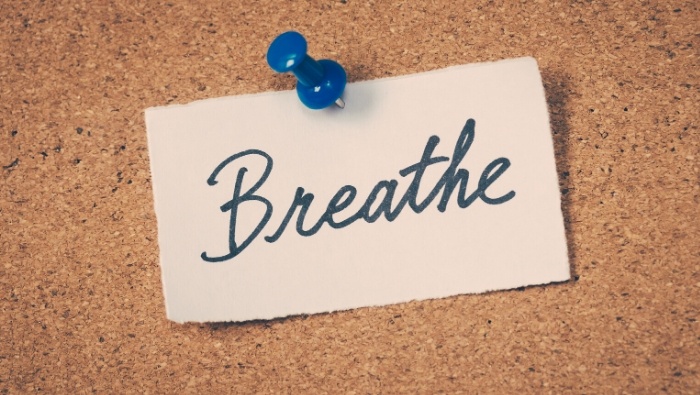Free Anxiety Fixes for Tough Times

When life suddenly looks very different and the future even more uncertain, it’s normal to feel anxious. These anxiety fixes can help you through tough times without adding to your financial burden.
Extraordinary times, such as those experienced by much of the country lately, can lead to exceptional stress.
If this sounds familiar, take heart.
It’s normal to feel anxiety in times of change and uncertainty, but some quick, at-home techniques can help you feel calmer and more relaxed.
Take a Breath
Seriously. Take a breath. Take a breath, but be intentional about it.
According to the National Institutes of Health database, multiple scientific studies show that slow, deep breathing calms the autonomic nervous system, reduces anxiety symptoms, and promotes feelings of relaxation.
The American Lung Association offers simple guidelines for effective belly breathing: get in a comfortable position, place your hands on your belly. Breathe in slowly through your nose and feel your belly fill with air, like a balloon. Finally, “blow all of the air out slowly and gently through pursed lips as if you were blowing bubbles.” Repeat for five to ten minutes.
Sign Up for Savings
Subscribe to get money-saving content by email that can help you stretch your dollars further.
Twice each week, you'll receive articles and tips that can help you free up and keep more of your hard-earned money, even on the tightest of budgets.
We respect your privacy. Unsubscribe at any time.
Work It Out
Dr. John J. Ratey writes for Harvard Health Publishing that “lacing up your sneakers and getting out and moving may be the single best nonmedical solution we have for preventing and treating anxiety.”
Exercise helps lessen anxiety in many ways, including distracting us from the source of our anxiety, decreasing muscle tension, and increasing anti-anxiety neurotransmitters in the brain, such as serotonin. The good news is that any movement works, so put on some music and do the hokey pokey in your living room, take a walk, do some jumping jacks or pushups, or try some gentle stretching. Even gardening and housework can help.
Related: 5 Steps to Reducing Financial Stress
Play a Game
Break a negative thought or worry loop with the 5-4-3-2-1 game. It’s a well-known tenant of cognitive behavioral therapy that thoughts influence feelings. So if you’re feeling anxious, it may be because you are stuck on a negative thought or caught up in a cycle of worrying.
One way to calm anxious feelings is to change your thoughts. To get “out of your head” and ground yourself in your physical surroundings, try this exercise using the five senses from the University of Rochester Medical Center’s website. Notice five things you can see, then four things you can touch, three things you can hear, two things you can smell, and one thing you can taste. Taking the time to notice and acknowledge these things can help to slow your mind and calm your body.
Hug It Out
According to research at the Cleveland Clinic, hugs can help reduce stress by lowering cortisol levels in our bodies. The longer the hug, the better, but you should aim for at least 20 seconds.
Studies indicate that a good, firm hug may lead to the release of oxytocin, which increases mood-boosting hormones like dopamine and serotonin. If you live alone, don’t despair.
Researchers at Washington State University found that just ten minutes of petting an animal comes with similar stress-reducing effects.
Fidget
You may have been told to stop fidgeting as a child. Still, it turns out that fidgeting can help to use some nervous energy and help a person stay focused and calm, particularly when unable to move around.
So if staying at home more has you feeling restless and antsy, a fidget spinner could be for you.
Fidget spinners are easy to make from a simple piece of paper. Just follow these instructions from instructables.com. Making and coloring the spinner may have you feeling calmer before you even use it.
Have Some Self-Compassion
Perhaps the best way to reduce anxiety is with a bit of self-compassion. When our routines and lives suddenly look very different, and the future is even more uncertain than usual, it’s normal to feel some anxiety. It’s part of being human.
Using the self-care techniques in this article, limiting your news intake, staying in touch with family and friends, and sticking to a sleep schedule may help you alleviate some of that anxiety.
If you’re feeling severe anxiety or depression, are unable to sleep, or are thinking about harming yourself or others, please seek medical attention or help from a professional immediately. It’s healthy to ask for help when we need it. You can call the CDC’s Disaster Distress Hotline at 1-800-985-5990, text TalkWithUS to 66746, or seek local resources. As always, in an emergency, call 911.
Reviewed September 2023
Wouldn't you like to be a Stretcher too?
Subscribe to get our money-saving content twice per week by email and start living better for less.
We respect your privacy. Unsubscribe at any time.
Popular Articles
On After50Finances.com
- 9 Things You Need to Do Before You Retire
- You Didn’t Save Enough for Retirement and You’re 55+
- When Empty Nesters Reorganize and Declutter Their Home
- Reinventing Your Career in Your 50s or 60s
- What Mature Homeowners Should Know about Reverse Mortgages
- 2 Reasons to Collect Social Security Benefits As Soon As Possible


